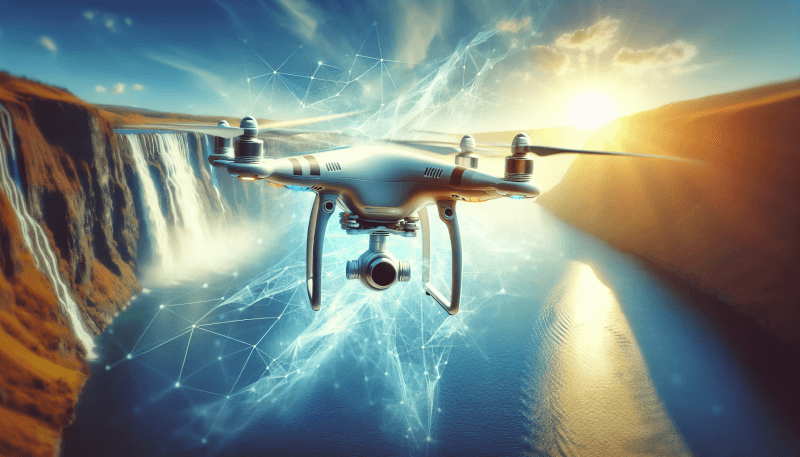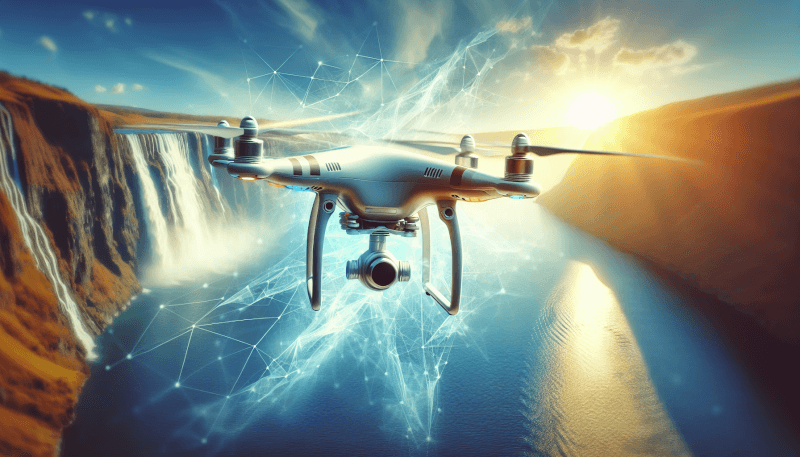So you want to start a drone technology business? Well, you’re in the right place! In this article, we will explore all the essential steps and strategies to help you kickstart your entrepreneurial journey in the thrilling world of drone technology. From understanding the market potential and selecting the right drones to building a strong network and marketing your services, we’ve got you covered. Whether you’re a tech enthusiast, a photography lover, or a problem solver, starting your own drone technology business can be an exciting and rewarding endeavor. So let’s get ready to take off and soar to new heights of success!
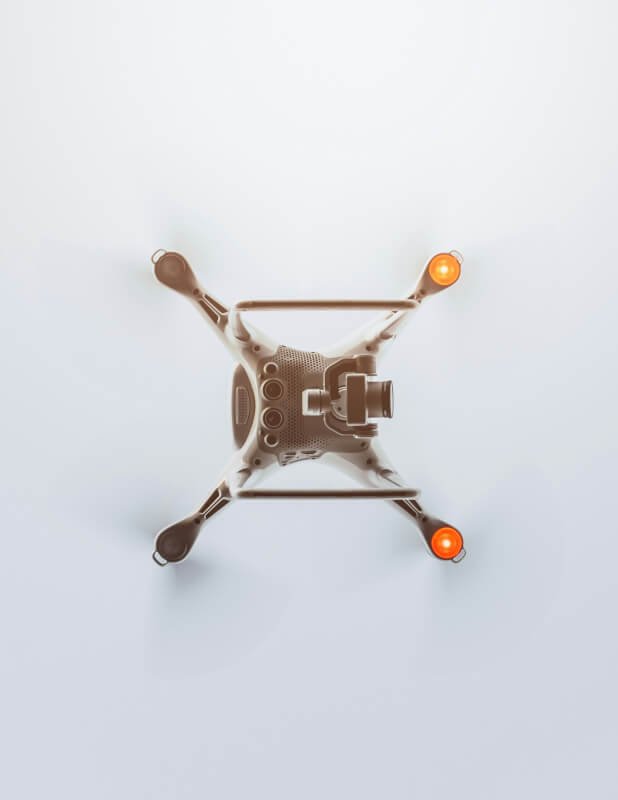
Understanding the Drone Technology Industry
The drone technology industry is experiencing rapid growth and offers immense potential for entrepreneurs. Drones, also known as unmanned aerial vehicles (UAVs), have revolutionized various sectors such as agriculture, construction, photography, and surveying. It is essential to explore the growth potential and various sectors within the drone industry to understand the opportunities available.
Exploring the growth potential of the drone market
The drone market is expanding at an unprecedented rate and is expected to reach new heights in the coming years. With advancements in technology and a wide range of applications, the demand for drone technology continues to soar. The global drone market size is anticipated to exceed $40 billion by 2025, reflecting the lucrative opportunities in this sector. As an aspiring entrepreneur, understanding this growth potential is crucial in devising a successful business plan.
Identifying the different sectors in the drone industry
The drone industry encompasses various sectors that utilize UAVs for specific purposes. Some of these sectors include aerial photography and videography, agriculture, surveying and mapping, construction and infrastructure, delivery and logistics, and public safety. By identifying the sectors that align with your interests and expertise, you can narrow down your focus and tailor your services accordingly.
Understanding the current trends and innovations in drone technology
To stay competitive in the drone technology industry, it is vital to keep abreast of the latest trends and innovations. Technological advancements such as collision avoidance systems, longer flight times, improved camera capabilities, and autonomous flight features are consistently transforming the capabilities of drones. By staying updated with these developments, you can adapt your business strategies to meet the evolving needs of your clients.
Developing a Business Plan
Before launching your drone technology business, it is crucial to develop a comprehensive business plan. This plan will serve as a roadmap for your venture and help you make informed decisions along the way.
Conducting market research for your drone technology business
Market research is a critical step in understanding the competitive landscape and identifying potential customers. Conducting thorough market research will enable you to gather valuable insights, such as industry trends, customer preferences, and competitor analysis. This information will help you refine your business strategies and position your drone technology business effectively in the market.
Defining your target audience and analyzing the competition
Identifying your target audience is essential in tailoring your services and marketing efforts. Determine the industries and individuals who would benefit most from your drone technology services. Analyzing the competition will provide valuable insights into their strengths and weaknesses, allowing you to identify unique selling points and differentiators for your business.
Setting clear goals and objectives for your business
Setting clear and measurable goals is paramount to the success of any business. Determine what you want to achieve with your drone technology business, such as revenue targets, market share, or customer satisfaction metrics. By articulating clear goals, you can track your progress and make necessary adjustments to ensure the growth and sustainability of your venture.
Creating a financial plan and budget for your drone technology venture
Developing a financial plan and budget is essential to understand the financial aspects of your drone technology business. Consider factors such as startup costs, operational expenses, marketing budgets, and projected revenue streams. Evaluating your financial feasibility and forecasting your financials will enable you to make informed decisions and secure the necessary funding for your venture.
Acquiring the Necessary Skills and Knowledge
To establish a successful drone technology business, it is crucial to acquire the necessary skills and knowledge in this field. From understanding drone technology to obtaining necessary certifications, each step is vital in ensuring your competency and compliance with regulations.
Gaining a detailed understanding of drone technology and operations
To excel in the drone technology industry, develop a thorough understanding of drone technology, including different types, components, and flight operations. Familiarize yourself with aspects like flight controls, remote sensing, and maintenance requirements. This knowledge will not only enhance your operational capabilities but also enable you to provide reliable and efficient services to your clients.
Obtaining proper certifications and licenses
Proper certifications and licenses are essential for legally operating a drone technology business. Check the requirements in your jurisdiction and ensure compliance with regulations by acquiring the necessary certifications. Organizations such as the Federal Aviation Administration (FAA) in the United States offer certification programs that validate your drone piloting skills and ensure adherence to safety regulations.
Developing expertise in aerial photography and videography
Aerial photography and videography are sought-after services in the drone technology industry. Acquiring expertise in this field will enable you to capture stunning aerial imagery while maintaining high-quality standards. Learn about composition techniques, camera settings, and post-processing methods specific to aerial photography to provide exceptional visual content to your clients.
Learning about applicable laws and regulations
Operating a drone technology business requires compliance with local, state, and federal laws and regulations. Familiarize yourself with the legal requirements surrounding drone usage, airspace restrictions, permit processes, and privacy laws. Ensuring legal compliance will not only protect your business but also build trust with your clients.
Selecting the Right Drone Equipment
Choosing the right drone equipment is crucial in delivering reliable and high-quality services. Consider the purpose and applications of your drone technology business to determine the most suitable drone models and equipment.
Determining the purpose and applications of your drone technology business
Identify the primary purpose of your drone technology business, whether it’s aerial photography, surveying, inspections, or any other specialized service. Each application may require different features and capabilities in the drone equipment. Understanding your business’s purpose will help you make informed decisions when selecting the right drone equipment.
Evaluating different types and models of drones available in the market
The market offers a wide range of drones with varying features, capabilities, and price points. Conduct thorough research and evaluate different types and models of drones available. Consider factors such as flight range, payload capacity, camera quality, battery life, and stability features. This evaluation will ensure that you invest in the right equipment that aligns with your business requirements.
Considering factors like flight range, camera quality, and battery life
Flight range, camera quality, and battery life are critical considerations when selecting drone equipment. Determine the specific requirements of your business operations and match them with the capabilities offered by different drones. Longer flight ranges, higher camera resolutions, and extended battery life will enhance your operational capabilities and allow you to provide superior services to your clients.
Choosing the necessary accessories and additional equipment
In addition to choosing the right drone, select the necessary accessories and additional equipment that complement your business’s needs. These accessories may include extra batteries, propellers, carrying cases, memory cards, and spare parts. Depending on your niche services, consider investing in specialized equipment like gimbals or thermal imaging cameras to expand your capabilities and cater to a wider range of client needs.

Setting Up Your Drone Technology Business
Setting up your drone technology business involves various administrative and practical considerations to ensure a smooth and legally compliant operation.
Deciding on the legal structure for your business
Determine the most suitable legal structure for your drone technology business, whether it’s a sole proprietorship, partnership, limited liability company (LLC), or corporation. Each structure has its own advantages and implications, so consult with a legal professional or business advisor to make an informed decision.
Registering your drone technology business and obtaining necessary permits
Register your drone technology business with the appropriate government agencies, ensuring compliance with local regulations and requirements. Additionally, research and obtain any necessary permits or licenses specific to your operations, such as airspace authorizations or special flight permits. These registrations and permits will give you the legal authority to conduct your business activities.
Securing appropriate insurance coverage
Protect your drone technology business from potential risks and liabilities by securing appropriate insurance coverage. Consider liability insurance, hull insurance for your drones, and other specialized coverage depending on your services. Consulting with an insurance professional who specializes in drone insurance will ensure that you have comprehensive coverage tailored to your specific business needs.
Setting up a suitable workspace for drone maintenance and storage
Create a dedicated workspace for drone maintenance and storage. This workspace should be well-ventilated, secure, and equipped with the necessary tools and supplies to perform routine maintenance and repairs. Proper storage and maintenance practices will extend the lifespan of your drones and ensure their optimal performance during operations.
Launching and Marketing Your Business
Launching and marketing your drone technology business effectively will help you build brand awareness, attract customers, and generate revenue.
Creating a compelling brand identity for your drone technology business
Develop a unique and compelling brand identity for your drone technology business. This includes designing an attractive logo, creating a memorable tagline, and establishing a consistent visual identity across all marketing materials. Your brand identity should reflect the professionalism, reliability, and quality of services you provide.
Designing a professional website and establishing an online presence
In today’s digital age, having a professional website and a robust online presence is essential for business success. Design a user-friendly website that showcases your services, highlights your portfolio, and provides a seamless experience for potential clients. Utilize social media platforms and online directories to expand your reach and engage with your target audience effectively.
Implementing effective marketing strategies to reach your target audience
Craft a comprehensive marketing strategy that combines both digital and traditional marketing tactics to reach your target audience. Consider techniques such as search engine optimization (SEO), pay-per-click (PPC) advertising, social media marketing, content marketing, and email marketing. Tailor your messaging and marketing efforts to resonate with your target audience’s needs and preferences.
Collaborating with other businesses and professionals in related industries
Collaborating with other businesses and professionals in related industries can be mutually beneficial. Forge partnerships with photographers, videographers, real estate agents, event planners, construction companies, or any other businesses that can benefit from your drone services. By cross-promoting and leveraging each other’s networks, you can expand your reach and generate more business opportunities.
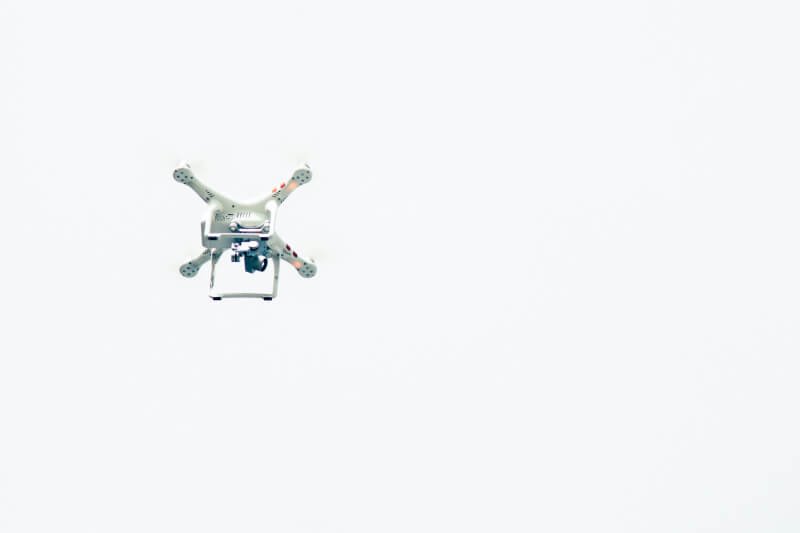
Offering Services and Generating Revenue
Identify the specific services you will offer and develop strategies to generate revenue from your drone technology business.
Identifying the services you will offer, such as aerial photography, surveying, or inspections
Determine the services you will specialize in based on your expertise and market demand. Common services include aerial photography and videography, surveying and mapping, inspections, agricultural monitoring, and infrastructure assessments. By focusing on specific services, you can develop a reputation for excellence in those areas and attract clients accordingly.
Setting competitive pricing for your drone technology services
Pricing your services competitively is crucial in attracting clients while maintaining profitability. Conduct market research to determine the average pricing in your region and consider factors such as operational costs, equipment depreciation, and level of expertise. Create pricing packages that offer value to your clients while ensuring a fair return on your investment.
Building relationships with potential clients and securing contracts
Networking and building relationships with potential clients is vital in generating business for your drone technology venture. Attend industry events, join professional associations, and engage in online communities to meet potential clients and showcase your expertise. Develop a strong pitch and presentation materials to effectively communicate the unique value and benefits of your services. Once you have identified interested clients, secure contracts that outline the scope of work, deliverables, and payment terms.
Exploring additional revenue streams, such as drone training or equipment sales
To diversify your revenue streams and expand your business opportunities, consider offering additional services or products related to your drone technology business. This could include providing drone training courses to aspiring pilots or selling drone equipment and accessories to fellow professionals or hobbyists. By tapping into related sectors, you can leverage your expertise and resources to generate additional income.
Maintaining and Expanding Your Drone Technology Business
To ensure the longevity and growth of your drone technology business, it is crucial to continuously maintain, adapt, and strive for expansion.
Developing a proactive maintenance and repair schedule for your drones
Establish a proactive maintenance and repair schedule for your drones to ensure their optimal performance and minimize operational downtime. Regularly inspect the drone components, update firmware, and conduct necessary repairs or replacements. By implementing a systematic maintenance plan, you can extend the lifespan of your drones and prevent potential issues during operations.
Staying updated with emerging drone technologies and advancements
The drone technology landscape is constantly evolving, with new advancements and innovations being introduced regularly. Stay up-to-date with the latest trends, research, and technological advancements in the drone industry. By investing in continuous learning and keeping pace with emerging technologies, you can differentiate your business and offer cutting-edge solutions to your clients.
Continuously analyzing market trends and adjusting your business strategies
Analyze market trends, customer feedback, and industry developments to identify opportunities and potential threats. By monitoring the market closely, you can adjust your business strategies and offerings accordingly. Stay agile and adaptive to capture emerging trends and maintain your competitive edge in the drone technology industry.
Exploring opportunities for expansion and diversification
As your drone technology business grows, explore opportunities for expansion and diversification. This could include expanding into new geographic areas, offering specialized services for niche markets, or developing proprietary software or applications to enhance your operations. By embracing innovation and exploring new avenues, you can unlock new revenue streams and solidify your position in the industry.
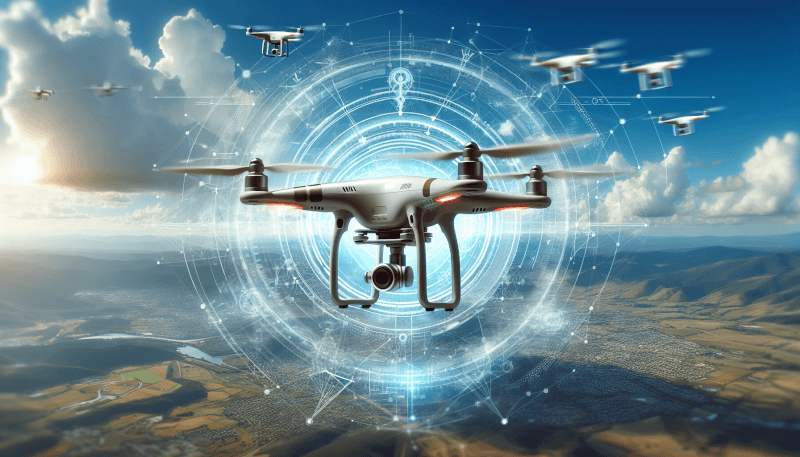
Ensuring Legal Compliance and Safety
Compliance with regulations and prioritizing safety is paramount in the drone technology industry. Safeguard your business’s reputation and protect the safety of the public by adhering to legal requirements and implementing rigorous safety practices.
Adhering to local, state, and federal regulations related to drone usage
Compliance with local, state, and federal regulations is a legal requirement for operating a drone technology business. Familiarize yourself with the regulations governing drone usage, airspace restrictions, flight limitations, and any licensing or certification requirements. Adhering to these regulations will ensure the legality and legitimacy of your operations.
Implementing safety protocols and risk management procedures
Prioritize safety by implementing proper safety protocols and risk management procedures. Establish pre-flight checklists, emergency procedures, and maintenance schedules to ensure the safe and efficient operation of your drones. Regularly assess and update these protocols to reflect industry best practices and emerging safety standards.
Securing necessary permits and permissions for each operation
Before conducting any drone operation, secure the necessary permits and permissions from the relevant authorities. This includes obtaining clearance for flying in restricted airspace, notifying local law enforcement or airports, and seeking consent from property owners if required. Failure to obtain the necessary permits can lead to legal consequences and reputational damage.
Educating yourself and your team about privacy and data protection laws
Operating a drone technology business involves capturing and handling vast amounts of data, including visual imagery and client information. Educate yourself and your team about privacy and data protection laws to ensure compliance and maintain the confidentiality of sensitive data. Implement secure data storage, access controls, and backup procedures to safeguard against potential data breaches.
Building a Skilled and Reliable Team
Building a skilled and reliable team is vital for the success of your drone technology business. Assemble a team of qualified professionals who share your passion and commitment to excellence.
Hiring qualified drone pilots and operators
Recruit qualified drone pilots and operators who possess the necessary certifications and experience to execute operations safely and efficiently. Look for individuals who demonstrate a strong understanding of drone technology, piloting skills, and compliance with regulations. Conduct thorough interviews, skill assessments, and background checks to ensure the competence and reliability of your team members.
Training your team on safe and effective drone operations
Prioritize ongoing training and development for your team members to enhance their skills and keep them updated with industry best practices. Offer training programs on safe and effective drone operations, emergency protocols, and maintenance procedures. Encourage continuous learning and provide opportunities for professional growth to foster a skilled and motivated workforce.
Employing professionals with expertise in aerial photography and videography
If your drone technology business focuses on aerial photography and videography, employ professionals with expertise in this field. Look for individuals with a strong portfolio and comprehensive knowledge of photography and videography techniques. Their expertise will contribute to the overall quality and appeal of your visual content, setting your business apart from competitors.
Fostering a positive and collaborative work environment
Nurture a positive and collaborative work environment that encourages teamwork, creativity, and open communication. Create a supportive culture that values each team member’s contributions and fosters their professional growth. By cultivating a positive work environment, you can attract and retain talented individuals who are passionate about their work and invested in the success of your drone technology business.
Starting a drone technology business requires thorough planning, acquiring the necessary skills and knowledge, selecting the right equipment, setting up your business infrastructure, implementing effective marketing strategies, generating revenue, maintaining compliance and safety, and building a skilled team. By approaching each aspect with diligence and enthusiasm, you can establish a successful and sustainable drone technology business in this dynamic and thriving industry.
